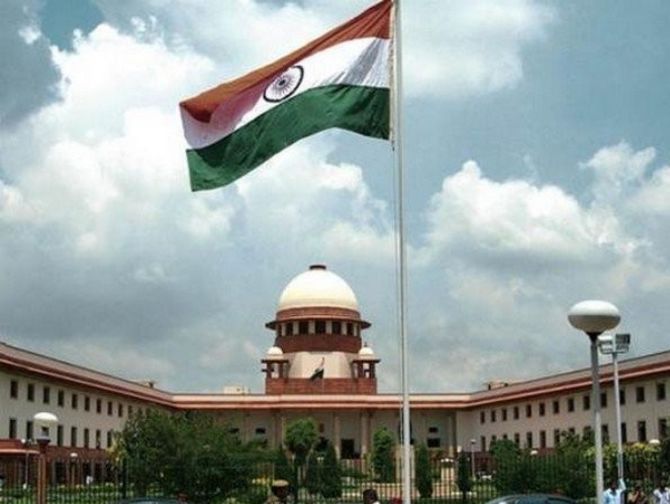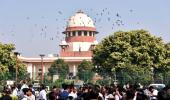'There is a special benefit in the matter being taken up by the Supreme Court rather than the high courts.'
'The orders of the high courts are limited, but the Supreme Court order is binding upon everybody.'

Ashwani Kumar, the former Congress MP and advocate whose letter to the Supreme Court -- about the undignified way in which COVID-19 patients and deceased were being treated -- was taken suo moto cognizance of by the apex court on Friday.
The Supreme Court has asked state governments to respond by June 17, which umar calls a 'major achievement'.
Earlier, Kumar had told Rediff.com%2F' target='_blank'>Rediff.com/<'strong>'s Prasanna D Zore that he expected the 'The Supreme Court, which is regarded and treated as, probably, the most powerful apex court in the world, must assert its extraordinary powers in aid of humanitarian causes.
This is what Kumar told Rediff.com at the end of a hectic day after the Supreme Court heard the case on Friday morning.
The Supreme Court took suo moto notice of your letter.
I am glad my letter is being noticed and the Supreme Court is seized of the issue.
In the hearing on Friday morning, they (the Supreme Court) issued notices to the chief secretaries of five-six states and asked them to file (their responses). The next date of hearing is June 17.
They (the Supreme Cpurt) have taken upon themselves the issues that I have raised about preserving the right to dignity of the patients and also about those who have died.
Will the court's directions be implemented by the state governments whenever issued?
I certainly hope so. If they didn't want to do anything, why would they take suo moto notice about it?
It is not as if somebody else has taken a personal cause to them. I wrote a letter to them making out a case that this should be the court's own cause as an enforcer of the Fundamental Right to Dignity. That part has been accepted by the court.
The court has taken cognisance of it; it listed the matter for hearing; it issued notices to the state governments to file their response; it has said this is a deplorable state of affairs.
It is a sorry state of affairs. We are not at all satisfied so you please file a response.
What do you have to say to make sure that these things don't happen? So the job is done.
The next hearing is on June 17. Do you think we will have hearing after hearing and nothing much would come out of this?
This won't happen. That is why they have given them only time till June 17.
Today (Friday) is the 12th. They have given them three days; Saturday and Sunday are holidays. So basically, the court has asked them to find a response within three-four working days.
I'm very hopeful something good will come out of it.
Are you satisfied now that the Supreme Court has taken notice of your letter?
I'm satisfied. My purpose was for the court to take up the matter which it has. I'm hopeful that something good will come out of it.
What exactly happens, I can't say with precision, but something positive will come out of it.
In fact, the fact that the Supreme Court itself has recognised the right to dignity and that it is being violated is in itself a major achievement and once they have recognised this, and once they have called the state governments to appear before them, the purpose of which is to issue instructions to them. Or to tell the states that this is what they must be doing in order to avoid such a scene in the future.
Are these directions issued only to chief secretaries of the state governments or also to Union governments?
They have been given to five-six state governments, the LNJP Hospital (Lok Nayak Jayaprakash Narayan Hospital in New Delhi) where dead bodies are lying in the morgue and the chief secretaries of states like Delhi, Maharashtra, Tamil Nadu, where the situation is very acute.
But the situation is also acute in Ahmedabad, Gujarat. Has any directions gone to the Gujarat chief secretary?
One thing is clear -- once the directions are given by the court, these directions will not be state specific. They will be for the entire country.
It is not necessary; in fact, if they had issued notices to 32 state governments, it would have taken so much time.
State governments would have come and said 'Please give us some more time'. That would have further dragged the issue.
I'm very happy that they have focused on five six states, whichever they thought were necessary. But whatever they will say, their direction will be applicable and binding to all (state governments).
That is why there is a special benefit in the matter being taken up by the Supreme Court rather than the high courts.
The orders of the high courts are limited, but the Supreme Court order is binding upon everybody.
This is what AshwaNI Kumar told Rediff.com on Thursday after writing the letter to the Supreme Court, drawing its attention to how COVID-19 patients were being treated in life and in death.
"I am aghast," says former law and justice minister Ashwani Kumar reacting to how he felt watching videos of COVID-19 patients being ill-treated in hospitals when they are alive and during burials/cremation after their deaths.
Kumar, a former Congress Rajya Sabha MP from Punjab, has written a letter to Chief Justice Sharad Arvind Bobde, and his companion justices, pleading to take suo moto cognisance of these instances and issue orders or writs to protect the right to dignity of COVID-19 patients who are being ill-treated.
Late in the evening, the Supreme Court took suo moto cognisance of Ashwani Kumar's letter and has listed the matter for hearing on Friday morning.
"The letter has been taken cognisance of and as requested by me the court will now be hearing the matter on a suo moto basis," Kumar tells Prasanna D Zore/Rediff.com.
What moved you to write a letter to the Supreme Court of India about treating COVID-19 patients with dignity, in their life and death?
When I saw the news (about a health worker in Puducherry pushing a dead body into a grave) on NDTV, what I saw just shook me and my confidence.
I said that if this is the fate of people who are completely vulnerable and also those who have died (due to COVID-19), then how can we claim that our Constitution and our Republic is a dignitarian Republic.
The Right to Dignity has been proclaimed repeatedly from the house tops as the core Constitutional right at the pinnacle, in the hierarchy of Constitutional rights.
But they all seem platitudes to me; they all seem intentions of pious hope.
And if the Supreme Court's and the high courts' judgment on the question are not to be enforced, what is the purpose telling people that ours is a dignitarian Constitution?
And therefore, both as a matter of empathy and shocked conscience, and also as a matter of the rights of citizens I thought that least I could do was to write to the Chief Justice and the honorable companion justices of the court to enforce their own decision.
The court has both the power, coupled with the duty, to enforce the law that it declares its own.
So the court has declared it (Right to Dignity) to be the law. So, it is now the duty of the court (SC) to have it enforced.
But can the Supreme Court enforce...?
(interrupts) Of course!
Any direction or order by the Supreme Court under Article 141 and 142 of the Constitution constitute the source of the law.
They are binding, legal mandates to the executive. And, in case the executive are not to enforce the decisions of the court, it would tantamount to the government itself not being true to the oath of allegiance to the Constitution.
It could lead to a great Constitutional crisis and can be ground for the dismissal of the government itself.
So on the one hand, we can have the Supreme Court can enforce its own decisions/laws, but on the other hand, we have in complete shambles the health infrastructure of the country, it is completely creaking.
How can governments possibly be present everywhere and ensure such incidents don't take place?
That, of course, is another point.
How will the Supreme Court's enforcement actually help those suffering or dying of COVID-19?
How will it ensure that people are treated with dignity when they are being treated or given a dignified cremation or burial?
Quite clearly, the visuals showed a fully clad frontline worker, for whom we have respect, fully-clad in the personal protection equipment gear, throwing the body into the pit.
For what purpose did he have to do so? This is the minimal that can be ensured by the hospital management, by the mortuaries management, by the municipal corporations, by all the people concerned.
After all, somebody dug the grave, somebody dug the pit, somebody carried the body, and these are all workers paid out of the exchequer of the government.
This is not a case of a legal impossibility. It is not something which is beyond the remit or the capacity of the State.
The State can certainly ensure that we give a decent burial or cremation to the dead. This is not a case where the State can plead lack of resources.
We talk about a $2.2 trillion economy, the fifth largest economy of the world, rising regional and global power, and we can't give dignity in death also to our citizens?
It mocks the conscience of the Constitution. It mocks our claims to be a civilised society wedded to dignity as a core Constitutional value.
Somebody has to speak truth to power. And let me tell you, these issues, may have been raised earlier and will continue to be raised later.
I strongly believe as a citizen and as a political activist and as a lawyer and officer of the court, that fundamental values have to be reiterated all the time. Lest people begin to accept that they don't exist.
Haven't we already reached that stage?
No. I don't think so. I am an optimist, I am hopeful. After all, look at the case of the migrants!
After the initial relapse by the Supreme Court, the Supreme Court was goaded into action because of the huge public outrage against the initial observations of the Supreme Court.
So the court cannot function in isolation and without considering the sensitivities of the people for whom it functions.
It is not a question of really punishing someone. It is really a matter that concerns the future treatment given to people in hospitals.
Look at this patient who was chained to a hospital bed (this happened in Madhya Pradesh).
Tell me which civilised nation does that? I am aghast.
I've been writing on the issue of human dignity. I have raised an issue of custodial torture, a law to be brought and all I can say is that the inconsistency of the court in dealing with matters concerning human dignity and liberty of citizens is also shocking.
While your letter highlights the undignified way in which COVID patients are treated, there's also another issue that is quite serious and that is a non-availability of hospital beds now.
Patients are running from pillar to post to get admissions into hospitals. They are dying in autorickshaws; they are dying in ambulances; they are dying in the streets right in front of hospitals.
Should the Supreme Court also take suo moto cognisance of this grave situation?
In cities like Mumbai and Delhi, the situation is serious as is evident from the many stories being narrated by relatives of those suffering because of the shortage of hospital beds and patients not being admitted into hospitals.
Let me answer your very pertinent question as under.
The resilience, the strength and the relevance of institutions of governance is tested in trying times.
These are the times when institutions in a dignitarian and libertarian democracy have to rise to the occasion to translate into action the promise of the Constitution.
Otherwise, people will lose faith in judiciary, just as they have lost faith in the political executive.
And that is a recipe for anarchy.
In order to sustain our constitutional democracy, the institutions created by the Constitution have to keep faith with the people of India.
And the Supreme Court, which is regarded and treated as, probably, the most powerful apex court in the world, must assert its extraordinary powers of judicial review in aid of humanitarian causes.
The way the COVID pandemic is being handled, not only by the Union Government, but also by all various state governments, what does it tell you about how the governments of the day are treating the health issues that ail India?
I think at the core of the problem is a dismal spending money on public health.
My research tells me the total public spending, public spending that is government spending, on public health infrastructure is about 1.67 per cent of our GDP, it is certainly less than 2 per cent of our GDP.
Now, where is the justification for such a dismal allocation for the health of the citizens of the nation, which ultimately accounts for the strength of the nation?
It is a people of a country, their health, their education, their skills, their capacities that account for the strength of a nation, in whichever way you want to look at it.
So, until we exponentially increase the expenditure on public health, these problems will keep staring us in the face.
The pandemic is an opportunity for us to ramp up and exponentially increase government spending on public health.
Now, having said that, it is not my intention and I repeat, I am not faulting any government, governments at the centre or in the state as far as their intention to bring succour to the people is concerned. But certain managerial issues in the process are certainly open to question.
The way we treated (transportation/movement of) our migrants (to their home states from the states where they were stranded during the lockdown); the way we failed to ramp up the bed capacity in hotspots in the two-three months that were available to us (during the lockdown) and the way they are only now realising that it is an emergency situation leaves much to be desired.
Will the COVID-19 pandemic be an eyeopener for the Union government and state governments to spend more of their budgetary allocations on improving the country's health infrastructure?
I certainly hope they do. This is not a day of warning; I don't know when it will come. This is the gravest challenge to the very survival of humanity that we are witnessing today.
A happier world is the future, a different world in the future, has to be about fairness. It has to be about bridging the income inequality gaps, because poverty leads to multiple deprivations.
And what we are seeing today in terms of loss of dignity of the people, it is the loss of dignity of the poor and the marginalised, and it must shake us out of our slump.










